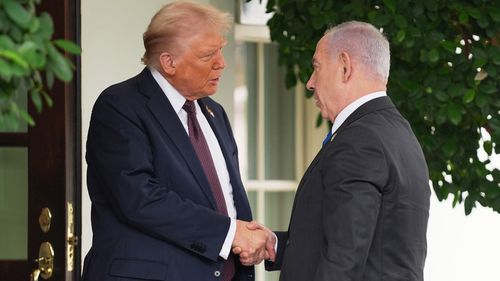Share this @internewscast.com

Hamas states it is still evaluating the proposal and will soon provide feedback. However, with Trump gathering international support for it, even from Hamas’ close allies, the Islamist faction could struggle to reject the plan.
“Instead of Hamas isolating us, we turned the tables and isolated Hamas,” Netanyahu boasted in a social media video before leaving Washington.
Netanyahu’s vision of ‘total victory’
Given Hamas’ deep roots in Palestinian society, critics have derided this vision as unrealistic. But Trump’s plan largely validates this goal.
Hamas will be required to release all captives, both alive and deceased, within days after the agreement is activated. The group will need to disarm and hand over authority to a collection of neutral experts, overseen by an international committee spearheaded by Trump and former British leader Tony Blair.

Israel will retain a continuous military footprint in Gaza, along its boundary with Israel. An international peacekeeping squad, mostly comprising soldiers from Arab and Muslim nations, will be accountable for maintaining security within Gaza. The US will initiate an extensive global reconstruction project financed in Gaza.
The framework envisages a possible role for the Palestinian Authority â a concept Netanyahu contradicts. Nevertheless, it compels the authority, which manages certain regions of the West Bank, to undergo a comprehensive reform process that might take years to finalize.
The Trump blueprint lacks specificity regarding a prospective Palestinian state â another deal-breaker for Netanyahu. Although it mentions a “viable path” to a two-state solution, the terminology is ambiguous and lacks deadlines, permitting Netanyahu to defer or overlook the matter.
In a social media statement, Netanyahu asserted he did not consent to a Palestinian state. “It’s a threat to Israel and naturally, we will not accede to it,” he declared.
So what’s in it for Hamas?
Hamas, which triggered the war on October 7, 2023, can claim some victories under the plan.
Most critically, it requires Israel to release hundreds of Palestinian prisoners, including some 250 who are serving life sentences for convictions in deadly attacks on Israelis. Such releases are painful and unpopular for the Israeli public.
Palestinians, however, view the prisoners as heroes and victims in a struggle against Israeli occupation, and any release would be seen by the Palestinian public as a major accomplishment.
Hamas can also claim that it forced Netanyahu to acknowledge Palestinian statehood aspirations, even if the wording in the plan is vague.

Israel also made other concessions: Trump and Israel abandoned a plan to push Gaza’s 2 million Palestinians out of the territory. The new proposal says all Palestinians can stay, and anyone who decides to leave will be allowed to return.
Israel also pledged not to annex or resettle Gaza â a dream favored by Netanyahu’s ultranationalist coalition allies. That comes after Netanyahu, under US and Arab pressure, appears to have dropped his threats to annex the West Bank.
The Trump plan does not mention the West Bank. Arab officials, speaking on condition of anonymity to discuss the closed-door negotiations, said such language was removed at Israel’s request.
Despite its small gains, Hamas appears to come out the big loser under the Trump plan. Yet it may not be able to refuse the offer. Trump told reporters at the White House on Tuesday that Hamas has “three or four days” to respond to the proposal.
After two years of war, Hamas has suffered heavy losses and wields only a small fraction of the power it once held. While it’s difficult to assess its popularity in Gaza, it is clear that many in the devastated territory want the war to end at any cost.
In addition, its main allies in the region â Iran and the Lebanon-based militant group Hezbollah â have been greatly weakened by Israeli and American attacks.
Arab countries’ expressions of support for the proposal also could back Hamas into a corner.
A joint statement by Arab and Muslim countries welcomed the proposal and expressed their readiness to work toward finalising and implementing it. They included Turkey, Egypt and Qatar â which have good working ties with Hamas â and other influential countries, such as Jordan, the United Arab Emirates, Indonesia, Pakistan and Saudi Arabia.

Still, the text of the proposal released by the White House on Monday raised reservations among some Arab countries, Arab officials told The Associated Press.
They said the text had been changed from what they had discussed with Trump previously to make it more favourable to Israel. They pointed to the vague terms about the withdrawal of Israel’s troops, the lack of a time-frame for allowing the Palestinian Authority to govern Gaza and the lack of a clear pathway to a state.
The officials said their countries were in touch with US officials about the changes. They spoke on condition of anonymity to discuss the behind-the-scenes talks.
That may give Hamas room to try to negotiate more favourable changes into the proposal.
But weakened by war, and increasingly isolated in the region, it may have no choice but to go along with the plan.













